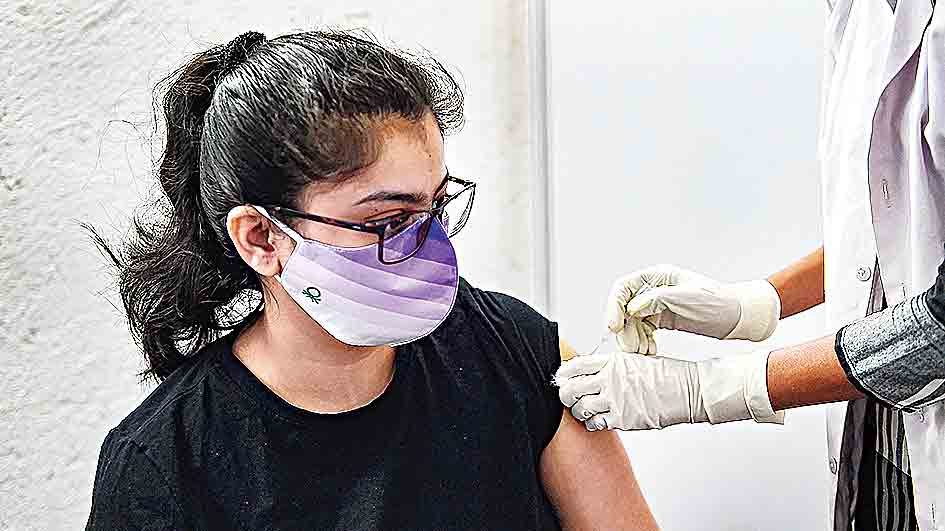A cocktail of two proteins called monoclonal antibodies has likely averted severe disease in hundreds to thousands of Covid-19 patients across India despite its cost limiting its access. However, its effectiveness against omicron remains to be tested, doctors and researchers said.
Doctors who have selectively prescribed the antibody cocktail to eligible patients across the country since India’s drug regulatory authority granted emergency use authorisation for the treatment earlier this year said they were pleased with their observations.
“It is not a treatment for all patients and it has to be timed correctly,” said Rahul Pandit, director of critical care medicine at Fortis Hospital in Mumbai and a member of Maharashtra’s Covid-19 task force. His hospital has since July treated 30 to 40 patients, he said.
The combination of antibodies, called casirivimab and imdevimab, is approved for patients with high risk of severe Covid-19 such as those with lung disease including asthma, high blood pressure, diabetes, kidney disorder, obesity or coronary artery disease, or those 60 years or older.
Doctors at the Apollo Indraprastha hospital in New Delhi estimate that about 50 patients have received the monoclonal antibodies at their centre and around 1,000 patients across Apollo’s network of hospitals across the country.
“Those who received it did not progress to severe disease,” said Viny Kantroo, a respiratory medicine specialist at Apollo Indraprastha. The treatment needs to be used within seven days of the onset of symptoms.
Medical studies have suggested that 15 to 20 per cent of patients with underlying chronic health disorders might advance to severe disease. “Which of the patients with co-morbidities will actually go into severe disease is something we cannot predict at the moment,” Kantroo said.
Drug regulatory authorities approved the treatment after clinical trials showed a 70 per cent reduced risk of hospitalisation or death in patients who had received the antibody cocktail compared with patients who had received standard care.
Roche India, the Indian arm of the Swiss pharmaceuticals company, and Mumbai-based Cipla had on May 24 launched the cocktail, saying the initial batches would support 200,000 patients and the price for each patient would be Rs 59,750. The price of a pack — which can be used to treat two patients — was set at Rs 119,500.
“Cost is an issue,” said Yogiraj Ray, associate professor at the infectious diseases department of the Institute of Postgraduate Medical Education and Research and SSKM Hospital, Calcutta.
“One vial can be shared by two patients, but a second eligible patient may not be available each time.”
But, Ray said, the cost of the cocktail is lower than what patients with severe disease would need to pay for oxygen and critical care bed support in hospital.
Medical researchers say the monoclonal antibodies, designed to target the coronavirus spike protein and block its entry into human cells, when used early in the infection are intended to curb viral loads and prevent severe disease.
But the two antibodies were tailored for the original strain of the coronavirus. Lab studies led by virologist Sandra Ciesek at Goethe University, Frankfurt, have indicated that casirivimab and imdevimab cannot neutralise omicron, the fast-spreading variant that has stirred fears of fresh Covid-19 waves.
“Since Omicron was resistant to casirivimab and imdevimab, virus genotyping may be needed before initiating monoclonal antibody treatment,” Ciesek and her colleagues said in a research report last week which is yet to be peer-reviewed but is posted on an online archive.
Pandit, however, said he would wait for patients’ data before drawing any inferences.
Nitin Gupta, an infectious disease specialist at the Kasturba Medical College, Manipal, said the evidence from the use of the cocktail thus far had been “favourable” but the cost had probably limited its use.
“But I know it’s also been used in government settings where patients have received it free,” Gupta said.
In Mumbai, Pandit said, the municipal corporation’s Seven Hills Hospital has used the cocktail on several hundred patients. In Bengal, Ray said, the state government had made available roughly 200 vials to several hospitals.











